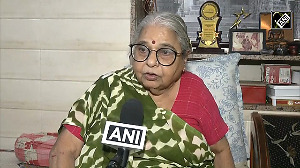Ramdev has approached the Supreme Court against the Delhi high court's recent landmark judgment decriminalising gay sex. He claims yoga practices -- pranayama and meditation -- can cure homosexuality, which he has also likened to 'madness' in some of his interviews.
"Is his statement based on scriptural evidence or evidence-based medicine? It is neither," says Dr Devdutt Pattanaik, physician, author and expert on Indian mythology. "It is just a subjective remark."
"Thousands of hours of research have gone into the classification of diseases, and neither the World Health Organisation nor any psychiatric or psychology journal recognises homosexuality as a disease. Do we believe scientific research or just an individual's opinion, which may simply be a marketing gimmick?"
His views are echoed by yoga expert Deepika Mehta, who has trained for more than 10 years at prestigious yoga institutes in India and abroad and was a student of the legendary K Pattabhi Jois of Mysore.
Mehta, who turned to yoga after a near-fatal accident left her paralysed, refuses to recognise homosexuality as a 'disease.'
"Yoga is about acceptance and coming to terms with who you really are, your purest core," she says. "It helps you shed the layers imposed by society. And in my experience, yoga has helped a lot of people come to terms with their sexual orientation, rather than live in denial."
"Baba's understanding of the body is very different," says Dr Pattanaik. "He is a very good yoga instructor. But if yoga could cure everything, why has it not cured his squint? Does he not consider it to be a problem?"
But the debate is not so much about the Baba's promise of a cure, but what it presupposes it -- the ailment.
"Not even the scriptures recognise homosexuality as a disease," Dr Pattanaik says.
And he wrote in a recent article, 'An overview of temple imagery, sacred narratives and religious scriptures does suggest that homosexual activities -- in some form -- did exist in ancient India. Though not part of the mainstream, its existence was acknowledged but not approved. There was some degree of tolerance when the act expressed itself in heterosexual terms -- when men 'became women' in their desire for other men, as the hijra legacy suggests.'
But he also points out that such "ancient sources also institutionalised subservience of women." So when does tradition end and commonsense begin?
Nitin Karani, trustee of the gay rights organisation Humsafar Trust, says, "While we don't know what leads to it yet, but we do know that homosexuality is innate. And it is not a Western phenomenon, as some people are trying to label it. Neither is it a disease."
"A lot of gay people I know are into yoga and meditation and are extremely spiritual, but it has not resulted in any overnight conversions," he adds.
A few agree with Ramdev; like Shiv Kumar, yoga expert who worked with Bollywood star Shilpa Shetty on her yoga DVD.
Kumar feels homosexuality is a "vikruti" (abnormality) stemming from "depression and frustration" which can be cured with yoga.
"Yoga is not like a Crocin you take for a headache," he says. "It is a lifestyle. But if you do it well and sincerely, you will begin to see the result in six months. Yoga's holistic approach helps maintain hormonal balance and gives you better control of your mind and body. And that could help overcome homosexuality."
Has anyone approached him for a 'cure for homosexuality'? "If you are having fun, would you say you have a problem," he asks back.
His argument: Organisations like the WHO are "influenced by the West" and they are "not sensitive to our culture."
Karani points out that last year the Indian Psychiatric Society declared that "homosexuality is not a disorder that should be discriminated against."
"When a person struggles with his sexuality, he often goes in for counselling. But I do not know of any instance where counselling has led to a conversion (to heterosexuality)," Karani says.
"This kind of irrational, unscientific statement will only create confusion and trouble," he adds. "Such statements will strike fear among those who are in the process of coming out, send a wrong message to their families and create panic. It could also lead to suicides."
Concludes Dr Pattanaik: "Baba Ramdev claims to have a cure for cancer and diabetes, but when his treatments fail the patients rush to a doctor. No one sues him. If he had his way, all pharmaceutical companies would shut down." The question is simple, he says. Whether to trust a body of scientific evidence -- or one person.





